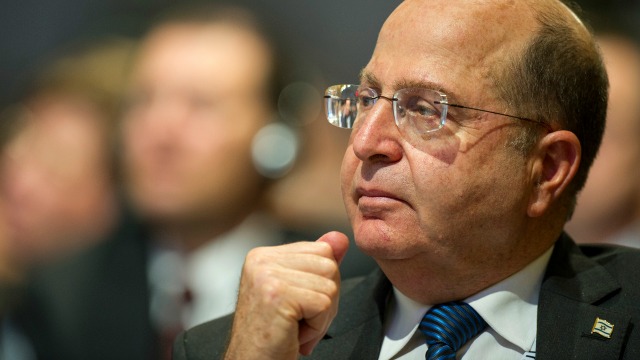Former Israeli Defense Minister Outlines ‘Grand Proactive’ Middle East Strategy for Trump Administration
 by Algemeiner Staff
by Algemeiner Staff
US President-elect Donald Trump will need to “formulate a grand strategy for the Middle East” with the primary question being “whether the United States intends on playing a more active or even more proactive role” in the region than it did during outgoing President Barack Obama’s time in office, a former Israeli defense minister said on Wednesday.
“I believe that the United States will have no other choice but to take a grand proactive strategy in the region — both in order to regain its standing as a world power, in a way that will also project its power in other regions, and in order to distance the Middle East threats from America, Europe, and elsewhere,” Moshe Ya’alon — a former IDF chief of staff who headed Israel’s Defense Ministry for three years before resigning this past May — wrote in an article published by the Tel Aviv University-affiliated Institute for National Security Studies.
Such a strategy, according to Ya’alon, will require “continued resolute fighting” against ISIS and policy changes vis-a-vis Iran, Turkey, Russia and Syria.
Regarding the Islamic Republic, Ya’alon — who has said he plans to return to Israeli politics in the future and vie for a position of leadership — wrote, “The Iranian regime is the most significant destabilizing factor in the Middle East, and therefore should not be seen as if it were a key element in stabilizing the region, since it is not part of the solution, but rather is the essence of the problem.”
Ya’alon continued, “The Iranian regime must suffer political and economic pressure, as a consequence of its violations of Security Council resolutions relating to weapons proliferation and to the development and manufacture of missiles (unrelated to the nuclear agreement), and due to its subversive operations and terrorist activities in Yemen, Saudi Arabia, Bahrain, Lebanon and Syria, alongside terrorist activities in the Palestinian arena and on five continents (where there are Iranian sleeper terrorist infrastructures). Another reason that pressure must be applied on the Iran regime is the human rights situation in this country.”
“Above all,” Ya’alon emphasized, “the US administration must take immediate action to prevent Iran from achieving military nuclear capability. Even if Iran complies with the nuclear agreement, it will be capable of manufacturing nuclear weapons within less than fifteen years. Coordinating the policy in this context with additional countries first requires immediate action in order to prevent any surprises in the future. Furthermore, a change in US policy toward Iran would strengthen relations and restore the trust that was lost between the United States and the Sunni Arab countries — its more natural partners.”
In an interview with The Algemeiner last month, Behnam Ben Taleblu — senior Iran analyst at the Foundation for Defense of Democracies (FDD) think tank in Washington, DC — said the Trump administration “should look to recent history and course-correct some of the issues in the deal that the current administration overlooked.”
“For instance,” Taleblu went on to say, “it should not excuse Iran’s excess production of heavy water, which has happened twice now. More broadly it should work to change a key dynamic in the JCPOA’s implementation, namely the asymmetry. Iranian officials often tout that America needs the deal more than they do. They regularly transgress the deal’s spirit and occasionally its letter. To change this, the Trump administration should aim for, borrowing from the noted academic Thomas Schelling, ‘the manipulation of risk,’ and make it known that Iran needs the accord more than the US.”
“Moreover,” Taleblu concluded, “the next administration should work to better define what constitutes a transgression, and not leave that up to Khamenei. It should also encourage greater transparency in IAEA reporting, something which was promised but has been lacking. And lastly, it should not let the deal prevent it from targeting Iran’s non-nuclear threats, namely ballistic missiles and its support for terrorism in the Middle East.”
 Iran Sentences Rapper Toomaj Salehi to Death Over 2022-23 Unrest
Iran Sentences Rapper Toomaj Salehi to Death Over 2022-23 Unrest Netanyahu: ‘Antisemitic Mobs Have Taken Over Leading U.S. Universities’
Netanyahu: ‘Antisemitic Mobs Have Taken Over Leading U.S. Universities’ U.S. Decides Against Sanctions on IDF’s Netzah Yehuda Battalion
U.S. Decides Against Sanctions on IDF’s Netzah Yehuda Battalion Israel Says It Is Poised to Move on Rafah
Israel Says It Is Poised to Move on Rafah Israeli Hostage Hersh Goldberg-Polin Seen Alive in a New Hamas Video
Israeli Hostage Hersh Goldberg-Polin Seen Alive in a New Hamas Video Palestinian Prime Minister Announces New Reform Package
Palestinian Prime Minister Announces New Reform Package France: Man Suspected of Abducting, Raping Jewish Woman ‘to Avenge Palestine’
France: Man Suspected of Abducting, Raping Jewish Woman ‘to Avenge Palestine’ Israel Intensifies Strikes Across Gaza, Orders New Evacuations in North
Israel Intensifies Strikes Across Gaza, Orders New Evacuations in North Iran Threatens to Annihilate Israel Should It Launch a Major Attack
Iran Threatens to Annihilate Israel Should It Launch a Major Attack ‘Completely Baseless’: Reports of Mass Graves at Gaza Hospitals are False, IDF Says
‘Completely Baseless’: Reports of Mass Graves at Gaza Hospitals are False, IDF Says




 Israeli Hostage Hersh Goldberg-Polin Seen Alive in a New Hamas Video
Israeli Hostage Hersh Goldberg-Polin Seen Alive in a New Hamas Video Israel Says It Is Poised to Move on Rafah
Israel Says It Is Poised to Move on Rafah U.S. Decides Against Sanctions on IDF’s Netzah Yehuda Battalion
U.S. Decides Against Sanctions on IDF’s Netzah Yehuda Battalion Netanyahu: ‘Antisemitic Mobs Have Taken Over Leading U.S. Universities’
Netanyahu: ‘Antisemitic Mobs Have Taken Over Leading U.S. Universities’ Iran Sentences Rapper Toomaj Salehi to Death Over 2022-23 Unrest
Iran Sentences Rapper Toomaj Salehi to Death Over 2022-23 Unrest